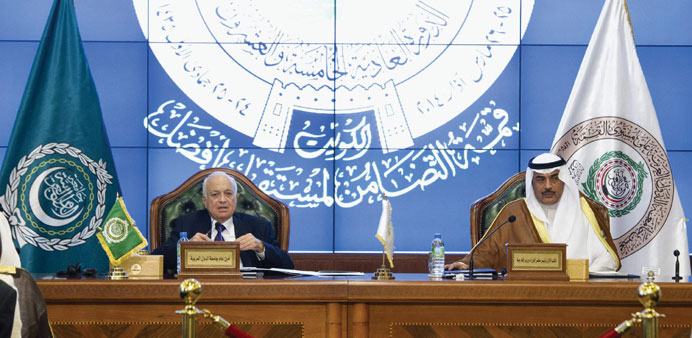Kuwait’s Foreign Minister Sheikh Sabah Khaled al-Sabah and Arab League Secretary General Nabil al-Arabi speak to the media after the closing session of the 25th Arab Summit in Bayan Palace, Kuwait City yesterday.
“We have no alternative to a political solution,” Kuwait’s Foreign Minister Sheikh Sabah Khaled al-Sabah tells a press conference following the summit
|
|
Arab leaders called yesterday for a political solution to the conflict in Syria sidestepping Saudi-backed demands for greater military support for rebel forces to tip the balance in the war.
But they were fully united in their support for Palestinian refusal to recognise Israel as a Jewish state, a flashpoint issue threatening to derail US-brokered peace talks.
Syria’s opposition National Coalition chief Ahmed Jarba had called at Tuesday’s opening of the two-day summit in Kuwait for the rebels to be supplied with “sophisticated” weaponry.
And Saudi Crown Prince Salman bin Abdulaziz, whose country is a key backer of the revolt against Syrian President Bashar al-Assad, said the world was “betraying” rebels by failing to arm them and leaving them “easy prey”.
But the final declaration by the summit called instead for a political solution to the three-year conflict, which has cost more than 146,000 lives.
“We call for a political solution to the crisis in Syria based on the Geneva I communique,” they said, urging the United Nations to renew its efforts after the failure of Geneva talks.
An international conference in the Swiss city in 2012 had called for a “peaceful transition” in Syria without specifying the fate of Assad.
“We have no alternative to a political solution,” Kuwait’s Foreign Minister Sheikh Sabah Khaled al-Sabah told a press conference following the summit.
Yet the leaders of the 22-member Arab League condemned the regime, while reaffirming their support for the opposition.
“We strongly condemn the massacres committed by the Syrian regime against unarmed people,” the statement said, reaffirming “total support for the Syrian National Coalition as a legitimate representative of the Syrian people”.
The Syrian government’s brutal repression of protests that erupted in March 2011 resulted in its suspension from the Cairo-based Arab League.
Yet while last year’s summit allocated Syria’s seat to the National Coalition, it remained vacant at the Kuwait meeting and will remain so until the opposition meets legal and technical requirements.
A clearly dissatisfied Jarba told the opening session that the decision “sends a message to the Assad regime encouraging it to continue to kill Syrians”.
Spokesman Louay Safi said differences among Arab foreign ministers at a meeting on Sunday had prevented the National Coalition from taking the seat.
“The new Arab decision reaffirms the previous decision... but the implementation was hindered due to disputes between Arab foreign ministers,” Safi told reporters.
The declaration echoed UN peace envoy Lakhdar Brahimi, who called for a political solution and urged an “end to the supply of arms to all parties”.
Syria sharply criticised the summit declaration and stressed that nothing would change “the clear decision by the Syrian state to protect its people against terrorism and to face up to it forcefully and firmly”.
Separately, Arab leaders announced their “total rejection of the call to consider Israel a Jewish state”.
The Palestinians recognised Israel at the start of the peace process in the early 1990s.
But Prime Minister Benjamin Netanyahu now insists they acknowledge Israel as the national homeland of the Jewish people, a move that would effectively torpedo the “right of return” for Palestinian refugees.
US Secretary of State John Kerry is facing an uphill battle to keep the floundering peace talks on track beyond an April 29 deadline.
Palestinian President Mahmoud Abbas, fresh from talks with President Barack Obama in Washington last week, told the summit that Palestinians “reject even discussing the issue”.
Netanyahu has placed the recognition dispute at the forefront of the talks, describing Arab rejection of the Jewish state as the “root of the conflict”.
For the Palestinians, the issue is intimately entwined with the fate of their refugees who were forced out of their homes or fled in 1948 when Israel became a state.
They see Netanyahu’s demand as a way to sidestep a negotiated solution to the refugee question.

